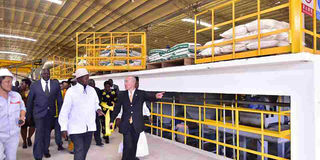Prime
Inside fight for multimillion dollar Tororo mining project

President Museveni (wearing hat) tours the fertiliser industry on Osukuru hills, Tororo District, in 2018. PHOTO/PPU
What you need to know:
Unresolved legal tussle keeps Shs2.2 trillion phosphate comprehensive project in limbo
A legal battle over licensing rights has stalled the takeoff of a multimillion dollar Osukuru fertiliser project, with no indication of a settlement in sight, internal correspondences seen by Saturday Monitor reveal.
The company was supposed to start producing fertilisers and related products three years ago, but is yet to commence operations due to a legal battle with Ms Fang Min, the proprietor of Fang Fang Hotel & Restaurant in Kampala.
Guangzhou Dong Song Energy Group Ltd was launched to implement the $620m (Shs2.2 trillion) Sukuru Phosphate Comprehensive Project.
Ms Fang Min sued the company in June 2016, accusing it of fraudulent acquisition of the project.
Before the Commercial Division of the High Court, Ms Fang Min claimed she had been duped in the process of acquiring the mining licence and sought compensation over the same.
She sought general and exemplary damages to cater to her shares in the assets of Uganda Hui Neng Mining Ltd.
The directors of the company denied any wrongdoing, insisting they refunded Fang Min’s money by depositing cash on her bank account in China. They further held that her claim of continued interest in Osukuru had no basis.
According to them, a sum of more than $10m (Shs35b) was deposited on her bank account in China.
“Fang Min has submitted a valuation report for 40 year’s mining right and exploration right, while the term of mining right is only 21 years and the term of exploration right is about three years and longest term of retention licence is three years. In that valuation report, investment risks, investment cost and whether it is appropriate to evaluate exploration right are not taken into consideration, so it is very unreasonable to unilaterally exaggerate the value of mining rights,” Mr Changmin Lee, the Guangzhou Dong Song Energy Group Ltd deputy general manager, said in a response to a query by Saturday Monitor.
He revealed that Hui Neng Mining Ltd only possessed an exploration licence, and all the processing costs and initial investment of the mining right were invested solely by Dongsong Energy Group (Uganda) Ltd.
The cost of the exploration license at the Ugandan Mineral Bureau, Mr Lee said, is only Shs3.8m, which he said invalidates Ms Min’s claim that she spent thousands of dollars on the same.
The plant is expected to produce purely organic fertilisers on the local market, with an annual target of 300,000 metric tonnes when commercial production starts.
“The huge phosphate deposits at Tororo, if linked with the huge natural gas deposits in Tanzania, would enable the region to forget about the importation of fertilisers such as Nitrogen, phosphates and potassium, among others,” President Museveni said at the launch of the project in 2018.
Mr Lee said they had obtained a financing facility from Industrial Commercial Bank of China (ICBC) for the entire project.
However, the bank cited Ms Fang Min’s case and risks associated with Covid-19 as grounds for the revision in its earlier commitment.
Mr Lee, said the company remains optimistic about the project and still works actively to rejuvenate it despite what he termed as conspiracies and resistances from various parties to frustrate it.
“We are law-abiding and we believe Uganda’s judicial processes will be fair to us and the future of the company,” he said.
Background
In 2016, Ms Min sued Mr Lv Weidong and other directors at Guangzhou Dong Song Energy Group Ltd, accusing them of fraudulent acquisition of the phosphate mining project in Osukuru.
Guangzhou Dong Song Energy Group Ltd was jointly sued with Uganda Hui Neng Mining Ltd, Mao Jie and Yang Junjia over alleged fraudulent and unlawful expropriation of 26 Sq kilometre mineral site.
Through her lawyers led by Mr Ebert Byenkya, Ms Min sought $25m (Shs88b) as compensation for loss of her business interest in terms of general and exemplary damages to cater for her shares in the assets of Uganda Hui Neng Mining Ltd which, she claimed, were illegally transferred to Guangzhou Dong Song Energy Group Ltd, the Uganda franchise of Guangschou Dong Song company based in China.
In court, Ms Min only filed a witness statement, while Mr Weidong testified in person. Ms Min alleged that she spent in excess of $5m (about Shs17.5b) to obtain mining licences and in administrative costs, which Mr Weidong, the director of Guangzhou Dong Song Energy Group Company Ltd, was to reimburse to the limit of her 20 percent shareholding.
Along the way, she claimed, Mr Weidong and two others, conspired to found Guangzhou Dongsong Energy Group Ltd, and transferred the joint venture’s mineral licence through fraudulent board resolution, before blocking her signature to the account. Justice David Wangutusi ruled in favour of Ms Min.
Energy ministry speaks out
Mr Vincent Kedi, the commissioner in-charge of licensing and administration at the Ministry of Energy and Mineral Development, says the project, especially the fertiliser production component, has not stalled completely.
He says it is the production of other aspects such as glass, steel, bricks and cosmetics, among other products that has stalled.
Prior to the Covid-19 pandemic, Mr Kedi says a lot of fertilisers were produced by the company and are still being sold.
He says they have advised the investor to look for other partners besides the pending financing from the Industrial Commercial Bank of China (ICBC).
“The bottom line is that the project has no money because of the court case which affected the financing plan. The project had started well and I am optimistic it will be pulled off,” he says.




